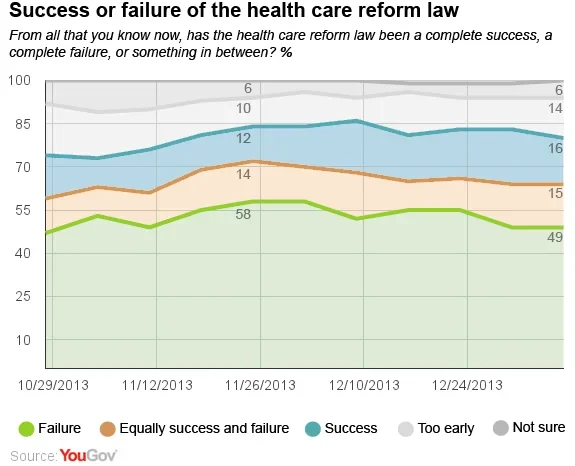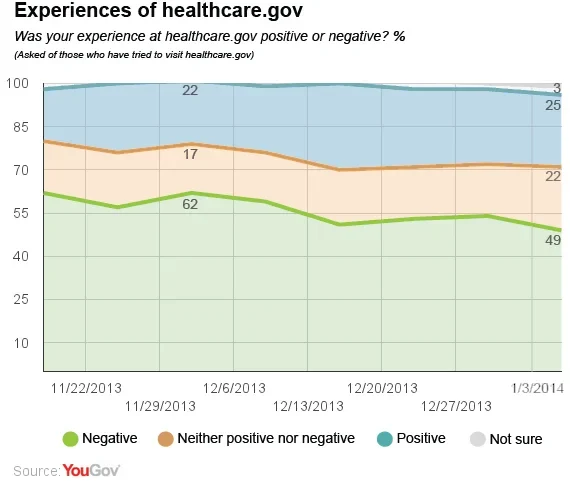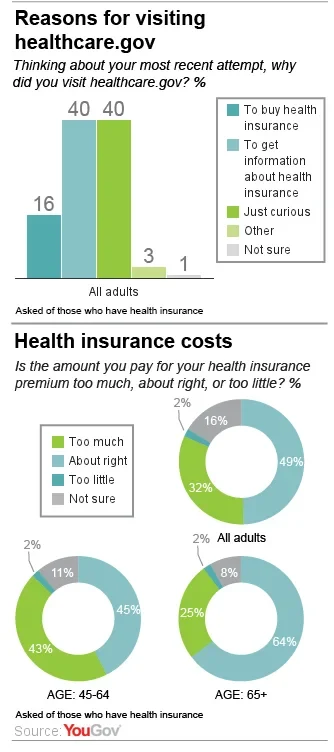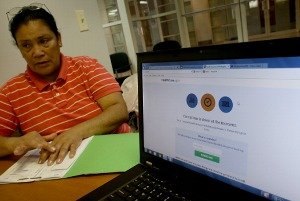People are reporting a better experience with healthcare.gov, but significant skepticism over the law and whether or not it is a success persists.
Improvements in accessibility for the government’s healthcare.gov website, and the growing number of signups for insurance through the website in December are reflected in this week’s Economist/YouGov Poll. More Americans have accessed healthcare.gov in recent weeks, and opinion about the site has improved a little; and there even has been ever-so-slight movement in overall perceptions of the Affordable Care Act itself. But the pace of change is glacial and the gains anemic.
Although Americans still consider the ACA more of a failure than a success, the last two weeks have marked the first time in more than two months fewer than half of Americans have called the act a failure – down from a high of 58% in late November.

And this week, just 49% describe their experience at healthcare.gov as negative – down 13 points from 62% in late November. Just 29% say their experience has been very negative, down 22 points from late November. In part, that reflects the experiences of those accessing the website more recently, after the computer fixes implemented at the start of last month. But the site experience still isn’t an easy – or positive – one for the typical user.

Many users made multiple attempts to use the site. People who last visit to the website was last month, after fixes were made to the site, had made an average of four attempts to reach the site. Nearly two-thirds of all site visitors were on the site after the fixes were made.
Many of those who accessed the site – and contributed to the server difficulties handling the volume of inquiries – didn’t need to use the portal at all. 40% of those who visited the site said they were simply curious about it, and were not looking for information or purchasing health care coverage. A majority of visits from Republicans were made out of curiosity. There is no indication in the poll that the share of curiosity-seekers among healthcare.gov visitors is declining.

There is a long way to go when it comes to reaching the White House goal of insuring 7 million Americans. More of those currently without health insurance say they would rather pay the fine than sign up. But nearly half the uninsured still aren’t sure what they will do. Americans have until March 31 to sign up and avoid the penalty this year; some, including those whose existing insurance plans failed to meet the new minimum coverage requirements and were cancelled, will be exempt from the requirement this year.
For years, Americans have complained more about health care costs than they have about the quality of American health care. Their complaints about the cost of benefits continue. A frequent comment those who have visited the site have been making in Economist/YouGov Polls over the last few weeks is the high cost of health care coverage for the plans that being offered on the site. But many people may be underestimating the cost of coverage – or hope they can pay less than insurance actually costs.
On average, Americans with insurance say that the amount they pay is “about right.” But one in three think they pay too much.
Concern about paying too much rises with age – those between the ages of 45 and 64 are equally likely to say they pay too much as to say they pay the right amount. After age 65, Americans feel better about insurance costs. Senior citizens, most of whom are covered by Medicare, are generally most satisfied with their payment costs. The premium for Medicare Part B in 2014 will be $104.90, close to the average Americans in this poll think a single person should have to pay for coverage.
That average – what people say is a “reasonable” payment for health insurance for a single person -- is $97 per month. What is considered reasonable varies by region, income, age and even partisanship. Older Americans say a monthly reasonable health care premium for a single person is $131, twice what those under 30 say is reasonable. Republicans, those who live in the West, and those with higher incomes also see higher monthly payments as acceptable.

Those currently with health insurance think $107 is a reasonable price to pay for a single person; those without health insurance put the figure at just $61.
According to the Kaiser Family Foundation, insurance premium costs several years ago were significantly more than that, averaging $215 per month per person covered.
Many Americans with insurance may not take into account employer contributions when they think of how much health care insurance plans actually cost. Nearly half of those with insurance coverage say their employer contributes to their health insurance premiums, and the figure is higher for those under 65, who are more likely than those 65 and older to be part of the workforce.
Also complicating the way Americans look at healthcare.gov insurance costs is that one in four Americans aren’t sure whether or not they qualify for the federal subsidy to help pay plan premiums.
Full results can be found here.
Economist/YouGov poll archives can be found here.
Note: The graphics in this article were edited on January 9, 2013









